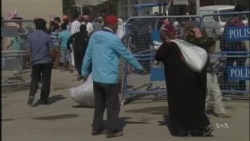The United Nations refugee agency says a record number of people worldwide have been displaced by war, violence and persecution and the number of people forced to flee their homes is rapidly growing.
In a new report issued Thursday, the UNHCR says that at the end of 2014, there were nearly 60 million forcibly displaced people, about 8 million more than the year before and about 20 million more than a decade ago. The increase since 2013 was the highest ever in a single year.
A major exodus of people from their homes started in 2011 with the eruption of civil war in Syria; but, in the past five years, armed conflicts and persecution also have sent people fleeing from their homes in Africa, Asia and Europe. Last year 42,500 people a day left their homes due to some type of violence.
"The world became a mess and if people think that humanitarians can clean up the mess, they are wrong. We don't have the capacity to pick up the pieces," said Antonio Guterres, the U.N. High Commissioner for Refugees.
One in every 122 humans is now either a refugee or internally displaced or seeking asylum. The report is a reflection of the state of the world today, said Guterres.
Syria is currently the world's biggest producer of displaced people and refugees, followed by Afghanistan and Somalia. Syria's neighbor, Turkey, has become the world's top refugee-hosting nation. Greece and Italy are swamped with refugees who want to settle in Europe.
European officials cannot agree on how to share the burden.
"Italy and Germany certainly both agree that we need to arrive at a more equitable distribution in Europe. In our view, the best way is mandatory quotas for the European member states," said German Foreign Minister Frank Walter Steinmeier.
Several EU members have balked at the idea and Hungary has announced plans to seal its border with Serbia. Many refugees use the Balkan route to reach Hungary on the way to Germany and Sweden.
In Southeast Asia, a move to block overland refugee routes from Myanmar into Thailand led to a humanitarian crisis in the Andaman Sea when thousands of refugees switched to the sea route.





